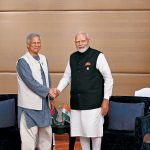Populists at Play
The East explains the new Western insurgency
 Roderick Matthews
Roderick Matthews
 Roderick Matthews
|
02 Feb, 2018
Roderick Matthews
|
02 Feb, 2018
/wp-content/uploads/2018/02/Trump1_2.jpg)
RIGHT-OF-CENTRE commentators all over the West are still convinced that populism is a friendly force. They trust ‘the people’ and believe that populism is a sign of history ‘going their way’. Are they correct?
The most successful of recent populist movements in the US and Europe certainly haven’t been led from the organised Left, but that may not tell us anything very useful. It might, in fact, be something of an illusion because most of the successful political movements of the last century had distinctly egalitarian elements within them, so that any assault on the status quo is likely to carry an apparent anti-left bias.
The populist upsurge does, however, represent a limited recalibration of political awareness. It feeds on perceptions of a clash between entrenched elites who are privileged and isolated, and fresh leaders who are demotic and virtuous—something that has been understood more widely as a nationalist reaction to the ambitions of an internationalist class of super-rich technocrats. On the other hand, the quest for definitions may just be an argument within the traditional elite about who can most skilfully co-opt the rogue forces recently unleashed by economic distress across the West.
Thus far, no one has convincingly explained what populism actually is, whether it is one thing replicated many times, or whether it is different in every case, dependent on the society that hosts it. Yet, in historical perspective, one thing is clear. Though populist movements tend to appear with frightening suddenness, they rarely sustain themselves effectively. They come in with a bang but generally leave with a whimper.
For sure, we do not yet understand how populism catches its moments, and what it can and can’t do. For instance, in the UK the Brexit vote was driven by all sorts of mythical beasts—powers we could regain, money we could save, borders we could fortify. This makes a poignant contrast with a most egregious display of actual elite neglect and arrogance—the Grenfell fire that killed 71 people, which has produced no political change at all, beyond resignations from the local council. No one within the political class was able to harness the cause and convert it into serious radical protest, and no one outside the elite has found a platform to speak for the millions who live in similar tower blocks.
The debate about populism in the West has been highly introverted, mostly because it seems like a new phenomenon—almost an affront—to most of the commentators who discuss it. It seems especially novel to the politicians whose careers it threatens, and who have been all too willing to dismiss it as a temporary failure of party messaging, rather than a true political universal of any kind.
The briefest study of South Asian history would have thrown helpful light on the subject for anyone who cared to look, but I don’t think I have once heard mention of the great populist names from the Subcontinent in any debate on the issue. Weimar Germany is about as far as anyone cares to look.
There seems to be a tacit assumption that there is a qualitative difference between Eastern populism and Western, but this is not tenable. Forty years ago, writers all over the world were analysing populism in South Asia, in the era of Indira Gandhi, Sheikh Mujibur Rahman and Zulfikar Ali Bhutto, and the main points they made still have a powerfully illuminating relevance.
Two things were particularly striking about these leaders and their movements—the simplicity of their messages and the improvised nature of the organisations they led. These two features still go together in the more recent examples, and offer us a bridge of understanding across the global phenomenon of populism. But so far, at least, the clues seem to have been missed.
The original analysis was that big figures with simple slogans enjoyed a distinct advantage in undereducated societies. Yes, true. But, somewhat embarrassingly, it turns out to be just as true in more sophisticated societies too. A commanding voice and a big character are assets anywhere and everywhere; emotional connection is a human fundamental. Donald Trump was liked, admired and trusted by a lot of people who never read Breitbart but got his message, whole, after seeing him for two minutes on TV.
Most populists in power are always hampered by their lack of organisation. As insurgents, they vilify the existing establishment which they claim has failed the people, only to require its help on the morrow of their victory
Here is where the havering politicians of our era, cramped by risk-averse committee management, lose out to louder, coarser opponents, whose fusion of cause and character substitutes for campaign funds and feet on the ground. Word of mouth is the best review, and populist insurgency uses this to the full. If you say in public what other people are already saying in private, your messaging is done for you. All you need to do is sharpen the ideas into stinging sound bites. No further persuasion is required—only recognition of the core grievances.
Populist messages are quick out of the traps, off and running before the mainstream politicians are up and about. The early bird knows where the worms are. But two major disadvantages come along too.
First, empathic simplicity is a campaign tool, not a plan for governing. Reforms are frequently complicated and slow; political compromises must be brokered and navigated. All this can be overlooked on the hustings but not in government. If the pace of change is too slow or too imperceptible, disappointment can easily grow. The great populists of South Asia were all haunted by disillusionment, including Solomon Bandaranaike, the regional pioneer, and all were dead before their time. Enthusiasm peaks around the point that a populist leader assumes office; experience shows that it’s only ever downhill after that.
Secondly, populists in power are always hampered by their lack of organisation. As insurgents, they vilify the existing establishment which they claim has failed the people—only to require its help on the morrow of their victory. The people may have an indomitable will, unalienable rights and just demands, but they don’t have a tool kit. What they want is change, and a change of leadership is the most easily understandable political change of them all.
THERE HAS SCARCELY ever been a successful populist movement that did not have a charismatic leader. In contemporary US politics, we can compare the consistent failure of the Tea Party over most of a decade, with its pale cadre of moaners and wailers, and the Trump bandwagon, which rolled triumphantly into power within months.
This underscores the general point that successful populists are not usually ideologues. At best they are dreamers, at worst opportunists or cynics. They create alluring visions of a better day, but they usually neglect to supply details. This is partly because details are never as inspiring as generalities, and entrancement—catching the listener’s attention—is more important than issuing orders or proffering detailed explanations. ‘Take Back Control’ or ‘Make America Great Again’ are brilliant slogans, despite the fact that they have no positive content and raise far more questions than they answer. Consider ‘Garibi Hatao’ or ‘Roti, Kapda aur Makaan’. And this mixture of optimism, inexperience and sly generality readily combines in fatal ways. Sometimes things don’t change enough—which will likely prove to be Trump’s undoing—but it is just as easy to go too far too fast, as was the case with Juan Perón in post-war Argentina or Hugo Chávez more recently in Venezuela. The Goldilocks amount of progress is hard to define, and always remains at the mercy of national and international contingencies.
Trump may have no surefire solutions, but he did a pretty good job of identifying the problems that his base was confronting. This is the test that any populist must pass, and he aced it
Most successful populists are rebels by natural disposition. They have stood aside from the mainstream, cocking snooks at the sincerity and competence of their incumbent opponents. Even when buoyed with fresh-found popularity, they must eventually face a moment when their wish lists no longer pass unexamined, as in the heated passion of a rally. This happened to Trump early on when his ill-drafted travel ban was struck down in court, and it is happening in the UK at the moment, particularly with regard to Ireland, where ‘hard Brexit’ fantasies are unravelling faster than a cardboard gearbox in a Jaguar.
Populist leaders end up marooned between dreams and practicalities. They over-promise and under-deliver, if, that is, they ever get nearer to power than a TV studio. But their core message remains seductively simple: “You can trust me. I love you and understand your concerns. Others have abused the power they held over you, but I will not.”
Populism is the cult of leadership, with the leader’s character and outlook directly coupled to the life and health of the nation—India becomes Indira—while, impervious to any irony, privileged voices—Trump, Farage, Le Pen, Moseley— claim to speak for the common man. But scarcely any of the charismatic pied pipers who claim to embody the nation ever turn out to be gifted administrators or sober governors.
It is very difficult for populism to limit itself to a positive agenda—it is driven by hidden negatives, implicit moral dichotomies of good and bad. Enemies of the leader and the cause become irredeemable, and we can detect this in all populist programmes. After the Brexit vote, the Daily Mail actually called High Court judges ‘enemies of the people’. Populist causes tip into crisis and repression far too easily. Witness Peron and Chavez again, not to mention Indira’s Emergency.
Trump is so much the classic populist that all the above applies to him in full force. There is a sense of permanent warfare just below the surface. How many headlines have we seen that begin with ‘Trump threatens…’? And he seems grimly determined to personalise all his diplomatic dealings, from his derision of Kim Jong-un to his refusal to come to London because of ‘slights’ from British politicians.
Populism turns inexperience into a qualification for government office, which virtually ensures that populist movements will either fail in power, or tame themselves into something less than they originally promise to be.
None of the South Asian populists transformed their societies to any appreciable degree. Hitler’s 1,000-year Reich only lasted twelve years and left Germany devastated and divided. Meticulous research has shown that Mussolini didn’t even make the trains run on time.
Will Trump deliver? There is reason to suspect that he will fail like the others. His lack of experience and his inflated rhetoric hint that he is not a great leader in the making. He is, above all, a great disrupter; he already has enough enemies, yet daily he collects more.
This largely explains his spectacular falling out with Steve Bannon, who passed for the brains of the organisation while Trump saw himself as the true heart and soul of America. Their estrangement perfectly illustrates the deep differences between ideologues and populists.
Populism is inescapably personal. When populists talk about jobs, foreigners, law and order or taxes, these things have a personal edge, which simplifies and sharpens political debate, to their advantage. Mohandas K Gandhi was the original genius of this approach. Trump is good at it too, while Steve Bannon is not. ‘Sloppy Steve’, sporting a crumpled suit under floor-mop coiffure, likes to talk of Judeo-Christian values and the global perils into which White people are currently sliding; too clever, too distant, too uninspiring. Trump is the opposite; dapper, familiar, fulminating.
Trump had no organisation to speak of, but his reckless commitment to attack scattered his opponents, and he seemed sufficiently in sympathy with Steve Bannon’s Church of the False Apocalypse to create a sense of final reckoning for the country. In the end, this added up not so much to a perfect storm, but an imperfect mess. Trump may have no surefire solutions, but he did a pretty good job of identifying the problems that his base was confronting. This is the test that any populist must pass, and he aced it.
Trump’s flaws are the classic flaws of populism writ large and loud. He is unlikely to find himself killed by his own army, hanged by his successor, or gunned down by his own bodyguards, but he has managed to embody the nation, defy the establishment and sloganeer his way to supreme power on a wave of uncritical popular approval. His success provides clear parallels with the meteoric South Asian leaders of the 1970s.

/wp-content/uploads/2025/07/Cover_Dalai-Lama.jpg)













More Columns
Alongside Dharavi Recast, Adani Lines Up Goregaon, Malad, BKC Slum Clusters Fast-Fast! Short Post
Land of a Hundred Thousand Welcomes — Just Not for Indians Alan Moore
From Entertainment to Baiting Scammers, The Journey of Two YouTubers Madhavankutty Pillai